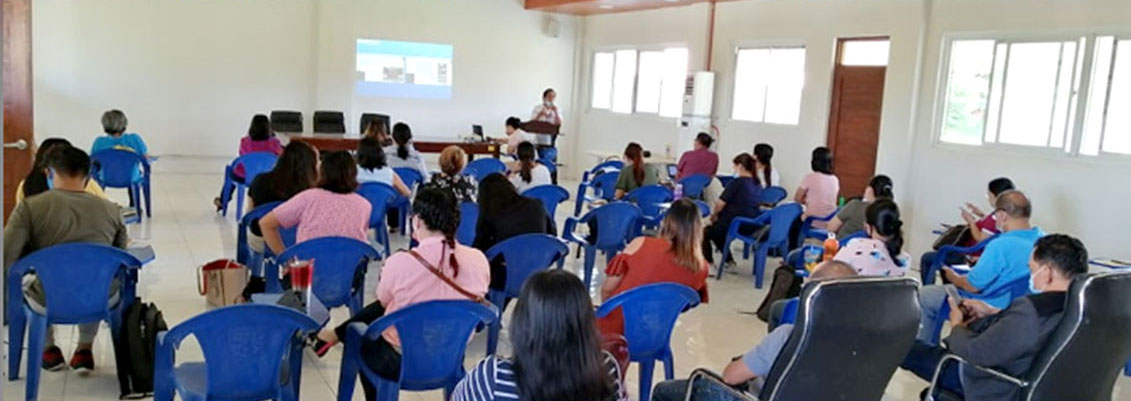
AB Comm, CAS prepare for Flexible Learning Adoption
To ensure the continuity of learning, the AB Communication Program extensively prepares for the adoption of Flexible Learning as the Commission on Higher Education and the Cagayan State University see this as the ‘more practical solution’ amid the COVID-19 threats.
This is the Program’s effort in continually seeking ways to ensure that students and teachers will not be left behind even during a health crisis.
Flexible Learning is an option that will include various learning interventions as learners are placed at the center of the teaching and learning process. This is also in response to the different context, needs and circumstances of diverse learners. This will also provide opportunities to reach the ‘unreached’ students. Flexible Learning also increases opportunities and options available to learners and give them greater control over their learning.
On July 3, 2020, the AB Communication and BS Industrial and Commercial Communication Faculty members headed by its Program Chair Mr. Jan Justin C. Rodriguez conducted a round-table discussion to ready the Program for the adoption of the Flexible Learning option in the delivery of their instructions for the 1st semester, School Year 2020-2021.
Rodriguez presented a framework to guide the Program in their transition to Remote Teaching and Learning (RTL) from the traditional face-to-face learning modality. The framework was an output from his previously attended Executive Course on RTL at the University of the Philippines-Open University that will be implemented in the context of CSU Carig’s AB Communication Program.
The framework focused on strengthening the four RTL sub-systems as introduced by UPOU will be used in the Program to decide for the adoption of practical and flexible learning options. These are: a). Course Design that includes learners’ situation assessment, modification of the instructional design, development of learning materials, identification of practical technologies and Learning Management System for RTL, etc.; b). the Teaching and Learning which includes conduct of faculty training, identification of student assessments, educational technologies, and teaching and learning delivery methods; c). the Student Support Services which include the conduct of RTL Readiness Program for the incoming freshmen students, teaching the learners on how to use the APA style, and strengthening the information services for students; and d). the Organization and Management which includes some policy recommendations for the provision of a conducive virtual classroom (AB Comm Production Room), teaching and learning technologies, printing of modules, among others.
Subsequently, the College of Arts and Sciences headed by its Dean, Dr. Jane R. Sambrana initiated the same activity for the different programs in the College last July 14, 2020. Dr. Jomel B. Manuel, Department Chair of the Arts and Humanities, and Mr. Jan Justin C. Rodriguez served as the speakers in the program entitled “CAS going Flexi-Learning: Seminar-Workshop on the Preparation to Remote Teaching and Learning Transition”. This gave the CAS faculty members an idea on how to transition their academic programs to Remote Teaching and Learning using the four identified sub-systems as their guide. Rodriguez shared the same lecture on RTL Transition while Manuel discussed about Module Writing. Outputs were the calibrated syllabus which includes the removal of related topics across major and minor subjects; simplified course requirements; and the integration of course requirements across major and minor subjects.
AB Comm’s Flexi Options
Based from the initial assessment of AB Communication learners including the incoming freshmen students, Remote Teaching and Learning using Online, Offline, Modular (printed modules), and m-Learning were seen as the most practical interventions to deliver quality and relevant instruction in communication education.
AB Communication faculty members will use the recently introduced Learning Management System (LMS), ‘Moodle’ for learners’ assessment and the Facebook Group as an alternative LMS (FB ALMS) for discussion forum. Video lectures, modules, and other learning resources will be uploaded in the FB ALMS for synchronous and asynchronous teaching and learning. Students with weak to no internet connectivity and access to technology such as smartphones will be reached through m-Learning and modular modalities. Printed modules will be sent to the students for the modular learning set-up and will be facilitated with m-Learning where teachers will call them via phone to reinforce student learning process.
Meanwhile, the Program recently started the Flexible Learning – RTL Readiness Program intended for incoming AB Comm freshmen students. This is a short module course delivered through Facebook Alternative Learning Management System to give the students an overview on how to be an online and distance learner using modern ICTs. At the same time, it will give them basic information about the AB Communication Program and how the Program will deliver the courses via online and offline modes.
These initiatives will ensure that students will still acquire the intended learning competencies and skills as equivalent to the residential learning or face-to-face setup.
The AB Communication Program with the strong support of the College assures its students that quality instructional delivery compliant with the rules and protocols set forth by the Inter Agency Task Force (AITF), the Commission on Higher Education, and the Cagayan State University will still be offered even during this pandemic time.
(Photos during the ABCOMM Round Table Discussion)

(Photos during the CAS Seminar-Workshop on Distance e-Learning/RTL)

